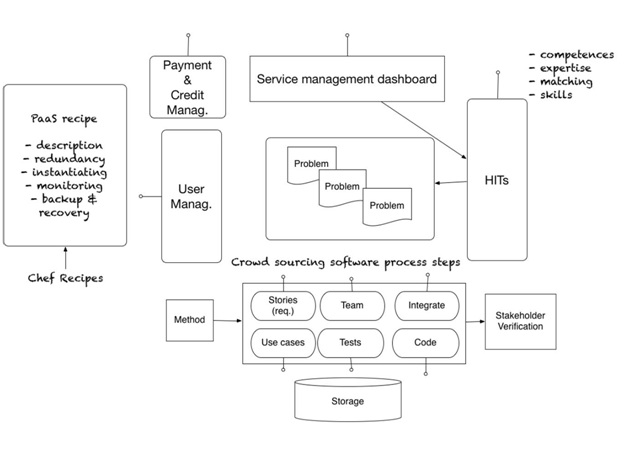We could put my hand on fire by stating that all your gadgets and technological devices have been (partly or wholly) manufactured in Taiwan and we do not burn up. But not only is manufacturing: design and R & D of many products and technological components also come from there.
In fact, Taiwan is one of the most research – intensive economies worldwide. It is estimated that invests about 3 percent of its production in research and development. Much of its economic power is related to the technology industry.
With an area of 36,000 square kilometers and 23 million people (making him one of the most densely populated), Taiwan is an example of economic miracle.
An economic miracle in figures
During the last half of the twentieth century the country experienced rapid industrialization that allowed him to have a fleeting economic growth. Together with Singapore, South Korea and Hong Kong, Taiwan is one of the so-called “four Asian tigers”.
Since 1992, Taiwan’s GDP grows at an average rate of 4.5 percent, from a per capita income of $9116 in 1992 to 19,762 in 2012. Therefore, Taiwan is the 28th richest country in the world and 6th in Asia.
In addition, Taiwan has experienced a rapid expansion in international trade. Exports of goods in the country in 2012, about 99 percent were in the industrial sector.

A technological power
Taiwan’s economy is it based largely on the production of parts and components that subsequently are incorporated into final products sold on many occasions by companies in the country and abroad, especially in Japan, the United States or the European Union. It is estimated more than 70 percent of Taiwan’s exports affect these products, known as intermediate goods. Which is especially noticeable in the field of information technology and communications (ICT).
Taiwan produces 94 percent of the base in the world and laptops plates. Asus is the first manufacturer of these products worldwide (already sold over 500 million units), with nearly 40% market share (in fact, it is estimated that one of every three computers have a plate Asus base). Diverse studies in Taiwan say that most of the chips used by US companies are manufactured.
But not everything is manufactured for others. Taiwan also has some recognized global brands such as ASUS, both for PCs, tablets and smartphones, as motherboards and graphics cards.
Policies favoring the economy
Getting all this is not the result of chance. The Taiwan government has launched a series of measures policies in the past aimed at improving decades innovative investment firms.
Many of these measures have focused on accelerating the development of high -tech sector, including the establishment of an industrial park in Hsinchu to provide an enabling environment for technology industry; signing partnerships to distribute the risks of business R & D; expanding research institutes sponsored by the government, in order to serve as a channel for technology transfer to the private sector; provide tax incentives to absorb some of the costs of the companies in their R & D; and facilitate access to sources of risk capital.
Much of the beneficiaries of these policies have been technology companies, many of which monopolize much of the equity securities listed on the Taiwan Stock Exchange.
Uniting university and business
It should also be noted that around Hsinchu Science Park (HSP), opened by the government in 1980 and where they have operations research and manufacturing more than 400 high – tech companies, two universities: the National Tsing Hua University (NTHU ) and National Chiao Tung University (NCTU).
And very close to these universities and the industrial park, is the Research Institute of Industrial Technology of Taiwan (ITRI), a research organization nonprofit organization founded in 1973 to provide industrial research applied to the Taiwanese industry.
Universities and ITRI prepare large numbers of workers of companies in the business park; corporate executives and officials ITRI taught at two universities; and university professors are turning to ITRI for assistance in the development of practical applications of their new ideas and sit on the advisory boards of local companies.
ITRI “has been praised as the incubator of CEOs of Taiwan” and the same could be said of the two universities. It should be noted that companies in the HSP park account for approximately 15 percent of GDP in Taiwan.
You may also like to read another article on xWorld: The cassette tape is back but this time the station is hipster!
The binding of small
But also, and l ITRI has played a key role in the development of Taiwan and its companies. Use and leave their laboratories to teach small businesses to catch up with cutting-edge technologies. These companies (which also signed alliances between them, sponsored by ITRI) and acquire the necessary knowledge so that they can be hired to be the industrial chains of large high-tech companies, both Taiwanese and foreign.
As a result, both large Taiwanese companies and multinationals from other countries rely on hundreds of domestic suppliers that can produce large quantities at a low margin, but with a fairly sophisticated design.
ITRI encourages SMEs to sign such alliances to divide research tasks, specialize and avoid duplication of efforts . Something that also underlies the success of many of these companies, starting in a small way and may end up being true giants.
One such example is ASUS. Jonney Shih, chairman of Asustek, claimed in an interview in 2011 that the standardization of the personal computer industry was a “good opportunity” for Taiwan, as it allows the rationalization of small businesses in aligned groups of specialized companies. “Thanks to standardization, products can be divided into sections. Some may make the motherboard. Other power supply. Some graphics card. I think for the industry in Taiwan is a very good opportunity.”
A Silicon Valley Asian
If many say that China is the factory of the world, Taiwan is proper as far as computers and telecommunications is concerned. So much so that we could say that is the Silicon Valley Asian. While the prime minister Lin Chuan has recently said that his challenge is precisely to establish a “Silicon Valley of Asia” in Taoyuan, Taiwan region. Although he has asked for patience, the project is expected to be the catalyst for transforming the future of Taiwan.
Thus, it is already working on a plan to make this place the new high – tech zone of the country. Under this project, the new industrial park will have an area of 21 hectares and will be mainly oriented towards the Internet of things, with the aim of producing goods with a total value of one billion dollars a year.
With this plan, Taiwan wants to remain an important factor in the technology industry of the future player.



